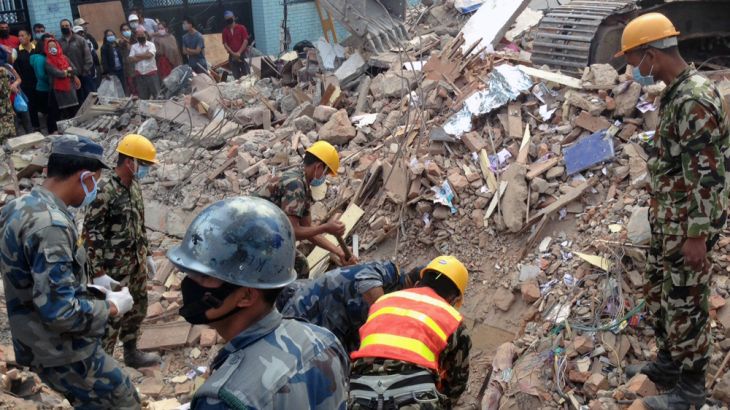Morale in Kathmandu as decimated as the buildings
Time is of the essence in the rescue mission in Nepal, but more than anything the people are desperate for hope.

Looking at Rishi Khanal in his hospital bed, you’d never guess how lucky he feels. The ever present pain in his eyes belies his sense of relief at having survived.
“I had to stay under the rubble for four days,” he says of his harrowing ordeal, adding, “with no food.”
Keep reading
list of 4 items‘Mama we’re dying’: Only able to hear her kids in Gaza in their final days
Europe pledges to boost aid to Sudan on unwelcome war anniversary
Birth, death, escape: Three women’s struggle through Sudan’s war
When the Nepal earthquake struck, the 28-year-old was staying with friends in a Kathmandu hotel.
Trapped for over 80 hours in the structure that collapsed around him, he watched friends die in the surrounding wreckage, and had to drink his own urine to stay alive. Many here consider his rescue a near miracle.
But it’s not just that terrifying ordeal, or the subsequent amputation of his leg, that has Khanal still feeling scared.
“I hope people will help me,” he explains. “I’m too young for something like this to happen to me.”
Like so many young Nepalese men, Khanal, a farmer, had decided leaving the country was the only way he’d be able to make enough money to support himself and his family. He was in Kathmandu, waiting for a flight out, when the quake hit.
“My flight to Dubai was scheduled for April 27 but the accident happened on April 25,” says Khanal.
Now, having lived through an experience so horrific that he’s made headlines across the country, Khanal is left wondering how and if he’ll be able to get by.
![Police say the death toll of the quake has topped 5,500 [Al Jazeera]](/wp-content/uploads/2015/04/aed4cc5a97474841a1989d5bb84b7c97_18.jpeg)
Kathmandu, where morale is as decimated as many of the buildings, is in desperate need of more survival stories like Khanal’s; something, anything, that will provide some much needed hope.
There was a much-needed boost for rescuers on Thursday, when a teenage boy was pulled from rubble alive, five days after the quake hit.
And yet, at numerous rescue and recovery sites throughout the city, the sense encountered most is one of resignation, that more bodies will surely be found, that too many hours have already passed.
“People can survive for days without eating,” says Binita Thapa as she watches the bodies of two neighbours being pulled out of their collapsed apartment building.
“Many of those trapped must still be alive,” she adds. “If they could be rescued in time, they would live… this is a disaster and we’re angry but there’s no one we can go to.”
In this neighbourhood, on the outskirts of Kathmandu, residents and rescue workers here have grown used to fearing – and seeing – the worst.
When the husband and wife are finally found, one wedding ring is clearly visible, even from a distance; appearing as though the couple were reaching out to each other – even in death.
![More than eight million of Nepal's residents have been affected by the earthquake, including 1.4 million who need immediate food assistance [Al Jazeera]](/wp-content/uploads/2015/04/5173cf97e4f649c7bd7ec1c96e7d75d0_18.jpeg)
While storm clouds gather, other buildings seem ready to tumble over at any minute – the grim realities seem to increase exponentially.
Residents, traumatised but curious, look on while standing as far back they can manage.
At the same time, a devastated sibling negotiates the release of his brother’s body.
“We need help to get the body home,” says Kalamat Miya, the dead man’s older brother. “We’re going to the Indian Embassy now to see if we can get any help.”
“Only those who have lost families,” explains Miya, on the verge of tears, “understand my pain.”
That pain is growing in Kathmandu, while fear spreads. The sun’s about to set and rain has begun to fall. On the lips of most here is one simple question: “will rescue efforts be hampered even futher?”
Still, nothing more can be done today. Crews pack up even though everyone knows time is of the essence.
Nikita Tripathi contributed to this report.
Follow Mohammed Jamjoom on Twitter: @MIJamjoom
![Rescue teams are still struggling to reach some of the worst-affected areas [Al Jazeera]](/wp-content/uploads/2015/04/dac37c77a2fd47cba9a524d1ec8a8a70_18.jpeg)